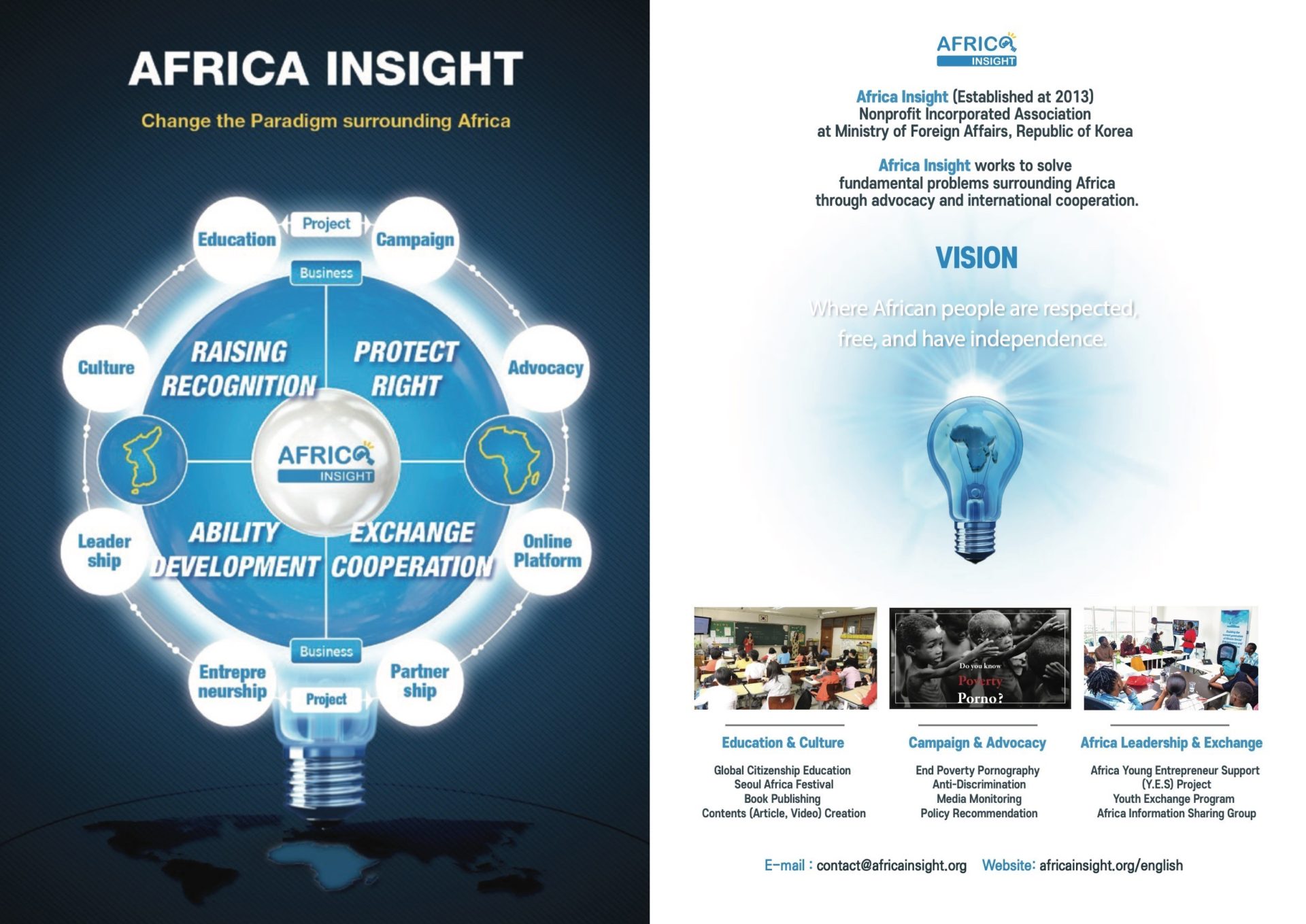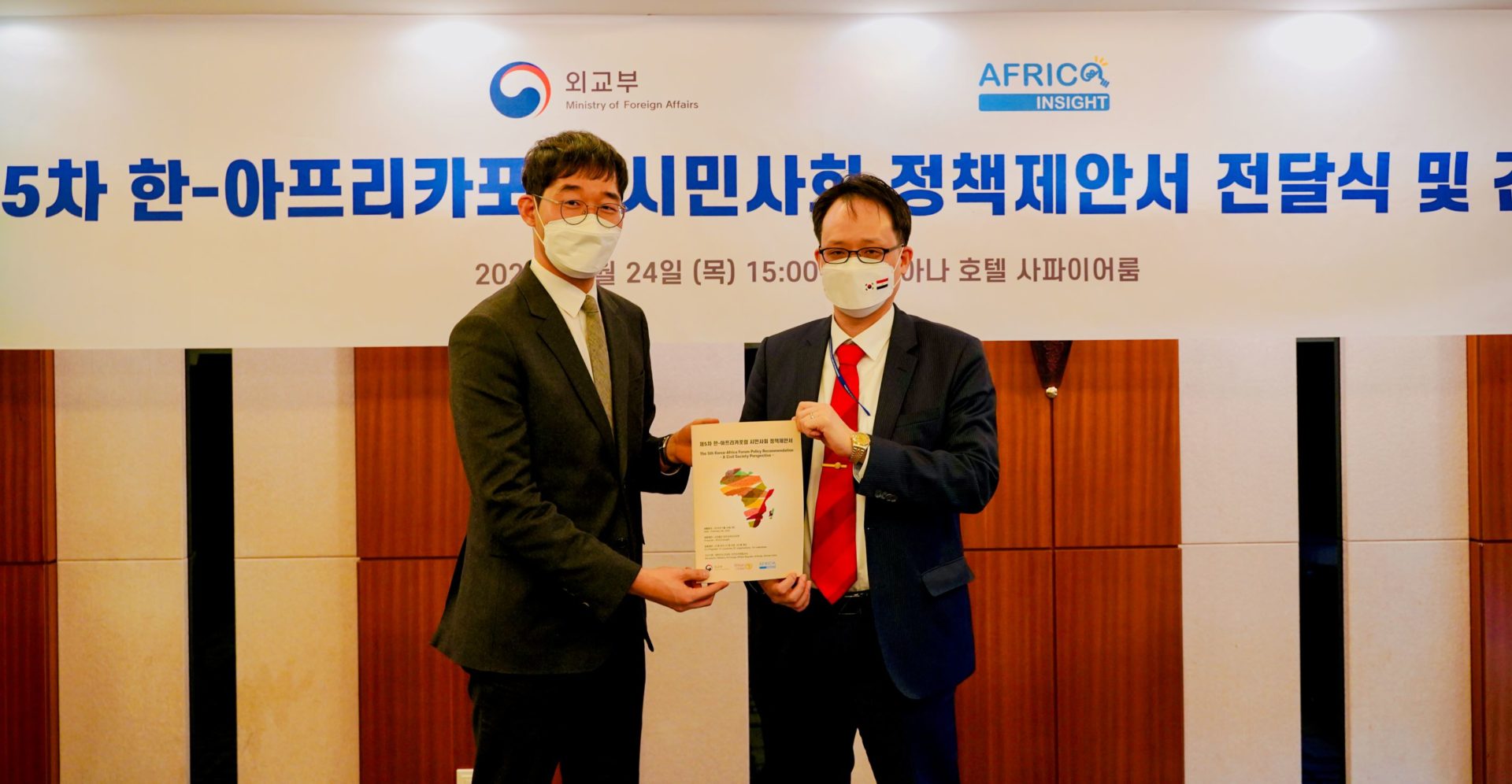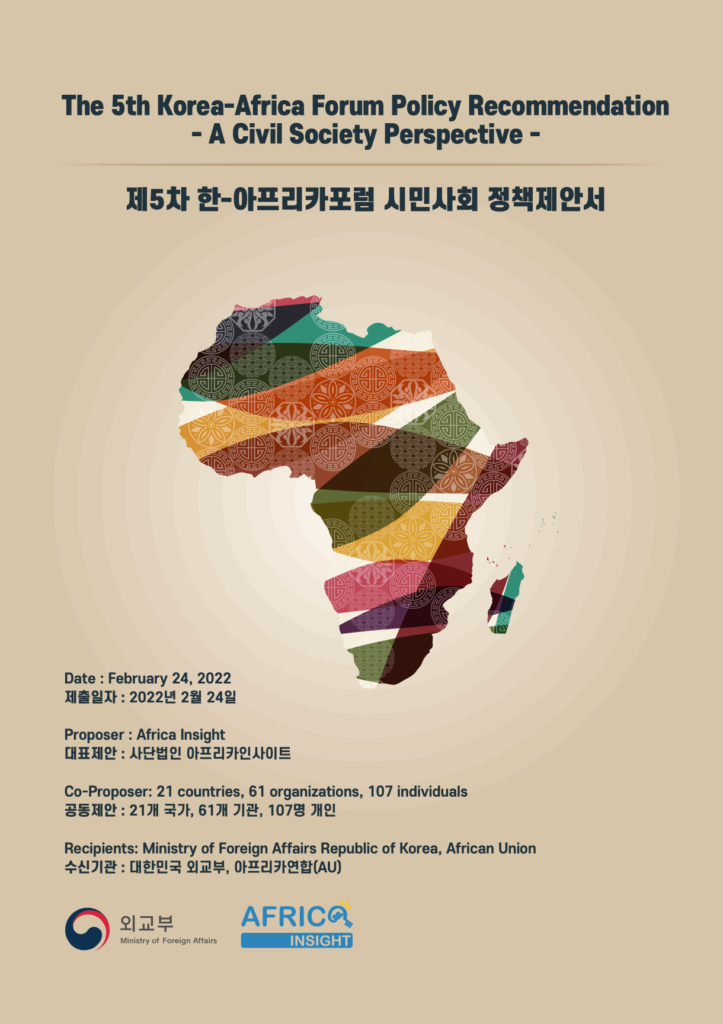Africa Insight informed Pressenza that, on behalf of Korean domestic and international CSOs, it has successfully submitted policy recommendations to the Ministry of Foreign Affairs of the Republic of Korea and the African Union Commission.

It has delivered more than 50 policy recommendation books to each high-level delegation and representative on the March 3, 2022 forum day. Africa Insight is a Seoul-based NGO that has the aim of facilitating education and awareness surrounding African development, both in Korea and worldwide. Submission of the 1st civil society policy recommendation has been made to the Korean government on the occasion of the 5th Korea-Africa Forum with 61 organizations and 107 individuals from 21 different countries.

On the basis of the Seoul Declaration, the Korea-Africa Framework of Cooperation 2022-2026, the wide range of cooperation recommendations includes, but is not limited, to set out the priority areas of cooperation for the next five years on the Response to Covid-19, under Development Cooperation, to facilitate Digital Innovation, Youth and Women Empowerment, Energy, Infrastructure and Industrialisation, Human resource development, Agriculture, trade and investment, peace and security, cultural exchange.
The first part of the document is CSO’s suggestions on Korea’s Foreign Policy towards Africa. With the permission and collaboration of the proposer, Africa Insight, we would like to feature here part of the shared documents.

Korea’s foreign policy towards the African continent
Korea must establish a tailored, distinctive, mid-to-long-term foreign policy towards the African continent, aiming for strengthened cooperation. A phased implementation strategy needs to be in place. Policies and strategies based solely on Korea’s perceptions and perspectives cannot succeed. It is imperative that Korea develops strategies ingrained in an extensive understanding of individual African countries with a phased implementation plan.
Mid-to-long-term strategies that reflect the African continent’s development and particularities.
Korea needs a mid-to-long-term strategy with its governmental projects when collaborating with the African continent, aligned to African Union’s (AU) Agenda 2063. The design of governmental projects should be a collaboration of Korean organizations with expertise in African issues, and the Korea-Africa Foundation. A 3-tier, phased approach should take place over 45 years with each period consisting of 15 years each.
1st period (15 years, 20th – 22nd administrations)
Establishment of the 1st priority task for cooperation with Africa (2022-2026)
Establishment of the 2nd priority task for cooperation with Africa (2027-2031)
Establishment of the 3rd priority task for cooperation with Africa (2032-2036)
2nd period (15 years, 23rd – 25th administrations) 2037-2051
3rd period (15 years, 26th – 28th administrations) 2052~2066
Control Tower for Cooperation with Africa. A control tower should be established directly under the President, or the Office for Government Policy Coordination. This office will be responsible to control, manage and monitor exchanges and cooperation between Korea and African countries, based on a mid-to-long-term plan. Currently, exchanges take place sporadically and in parallel among various entities, such as the government, National Assembly, provincial governments, public institutions, corporates, civil society organizations, etc.
Tailored and particular approaches
An empathy-based mutually beneficial approach. We need to establish a partnership between Korea and the African countries that is based on equality, long-term planning, and mutual understanding with a deeper and wider awareness of the past histories of colonialism and the slave trade. Many African countries are interested in Korea’s experience in pursuing economic growth and democratization simultaneously and have adopted Korea’s experience as an exemplar. Korea should actively share its experiences with African countries with consideration of the local contexts. Korea should also strategically use its comparative advantages in ICT, corporate/business competitiveness, and soft-power, also known as K-Culture. Korea needs a unified message and approach that is distinct from other countries, focused on citizen diplomacy and human interactions.
Korea’s foreign policy on the African continent to focus on key partner countries. Korea needs to utilize its limited resources more effectively by focusing on carefully designated partner countries with consideration of opinions from private-civil society sectors for its foreign policy. We need to simultaneously consider each country’s key interests, needs, and Korea’s policy trends. There needs to be a tailored approach for each country rather than a unified approach for several countries.
Investment in human resources
Support regional and sector experts working on Africa. A systematic support mechanism of monitoring and following-up with African regional and sector experts, such as African studies graduates, Korea National Diplomatic Academy alumni, government scholars, World Friends Korea overseas volunteers, and other African experts in the corporate sector are needed. Korea needs official mid-to-long-term planning and investment to support experts. Korea’s education sector needs to include multiculturalism and diversity in the curriculum, including the African continent so that young students will be exposed to unbiased information concerning the region from an early age.
Support for Korean nationals living in Africa. There needs to be an opinion survey and needs assessment of the approximately 10,000 Koreans (2019 statistics) living in African countries. This is in order to resolve difficulties faced by Koreans residing in African countries and to support Korean people’s advancement and entry into African countries. Based on this assessment, there needs to be increased support customized for each region and situation.
Investment in African human resources. Further expansion and training, scholarships, and exchange programs are needed so that more Africans can benefit from their experiences in Korea, demonstrate their expertise, and contribute to Korea-Africa relations, exchanges, and cooperation. An expansion of systematic and budgetary support is essential for activating African community activities and improving their residency conditions in Korea, which encourages more Africans to visit Korea and leads towards a self-sustaining system.
Expansion of public-private-civil society partnerships and public diplomacy.
Expansion of Korea’s diplomatic infrastructure in Africa. Korea’s diplomatic capacity in Africa must be strengthened by expanding its diplomatic infrastructure, such as budget and human resources as a reflection of Korea’s position in the international community.
Cooperation with civil society, academic institutions, and cultural/art groups. The government should work together with civil society and non-governmental sectors actively engaged in exchanges and cooperation with African countries in their respective expertise. Strengthening public-civil society cooperation, creating synergy effects, and expanding their impact will, in turn, enable the realization of public diplomacy.
Support for corporate/business investments and entry into Africa’s markets. An expansion of systematic and practical support through consultation with key partner countries and related ministries for Korean companies is needed to increase investments and operations in African countries.










